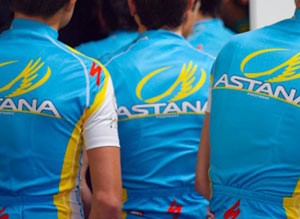‘On the basis of trust and transparency, Pro Team Astana finds the MPCC Code of Conduct to be a credible, voluntary step’
 Over a month after the possibility was first mentioned, the Astana team has made official its application to join the Movement for Credible Cycling (MPCC). It thus joins a queue of squads who are aiming to have their names added to the eleven-member list at its upcoming meeting on February 7th.
Over a month after the possibility was first mentioned, the Astana team has made official its application to join the Movement for Credible Cycling (MPCC). It thus joins a queue of squads who are aiming to have their names added to the eleven-member list at its upcoming meeting on February 7th.
The approach to the MPCC’s president Roger Legeay was undersigned by the new general manager Alexandre Vinokourov, who himself served a long suspension during his career but who states that the sport must move on from its past.
“As stakeholders in professional cycling and in full recognition of the importance in demonstrating publicly our determination to prevent doping, Pro Team Astana formally requests to join the Mouvement Pour un Cyclisme Credible,” he wrote in a letter to Legeay.
“Damaging practices in the past have created problems for professional cycling’s future, placing the reputation, image and viability of the sport at serious risk. Neither the doping practices nor the environment that served to enable them can ever be allowed to happen again.
“On the basis of trust and transparency, Pro Team Astana finds the MPCC Code of Conduct to be a credible, voluntary step towards protecting and re-establishing the positive, clean image of professional cycling.”
Aside from his two year suspension for blood doping, Vinokourov was also accused of buying victory in the 2010 Liège-Bastogne-Liège from breakaway companion Alexander Kolobnev. He denies the charge, which is being investigated by the UCI.
The MPCC is a voluntary organisation which requires teams to accept additional anti-doping rules over and above the obligatory UCI regulations and the WADA Code. Member teams agree to:
– No longer allow riders race after they have an initial positive test.
– Not sign up riders who have a suspension of more than six months [with the exception of whereabouts cases] for two years after the suspension.
– Not give corticoid injections without imposing a break from competition of eight days.
– Carry out internal procedures from the first positive case on a team.
– Suspend itself automatically following several positive cases in a twelve month period.
While the second of those rules would have essentially blocked Vinokourov from rejoining the team when he returned from his own suspension in 2009, he states that it is now time for squads to embrace the tougher position the Movement for Credible Cycling advocates.
“We share the MPCC’s belief that riders, managers and sponsors in professional cycling have the obligation and capacity to say no to doping, and call on the UCI to recognize the MPCC as a viable intermediary among teams, organizers and Cycling Federations,” he stated.